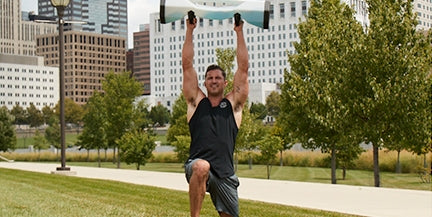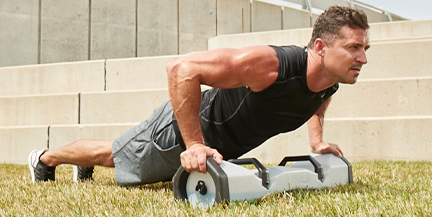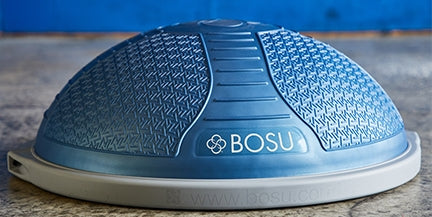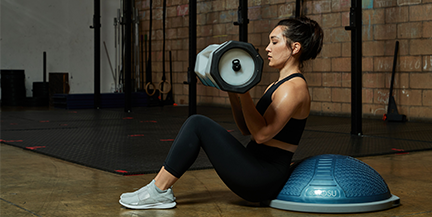Get on the Ball!

When you think about stability ball training, what comes to mind? Most likely, you envision crunches as your best options, but did you know you can progress beyond simple core exercises and challenge total body strength (and even get in some heart-pumping cardio) with one simple tool?
If you have not yet experienced the BOSU® Ballast® Ball, I highly recommend it! It looks like an old school stability ball, but it has 2.5 pounds of multi-dimensional load inside that offers some unique benefits. First, you will notice that the ball stays in place. If you have ever had a mishap with a stability ball rolling away, you know what I’m talking about! The good news is that the BallastÒBall won’t roll away as you execute various moves or transition between exercises. This allows for comfort and confidence, which will equate to a more effective workout experience. In addition, the weighted material inside the ball offers dynamic resistance. As you lift, shift or shake the ball, the material shifts inside to create a core stability challenge. The Ballast® Ball takes balance training to a whole new level!
This ladder circuit routine incorporates three functional exercises that target multiple muscle groups. It can be used as a finisher for any type of workout or as a short and sweet (but not easy!) stand-alone workout for a busy day.
Cycle through 6 repetitions of each exercise; then repeat the sequence for 8, 10 and 12 reps:
Squat, Roll, and Jump
Begin standing with your feet slightly wider than hip-width apart. Squat and place the ball on the floor in front of your feet. Hold the squat and roll the ball around your body. Then, lift the ball overhead, jump, and land in a squat.
Alignment Tip: Track knees in same direction as toes when squatting
Regression: Do a heel raise instead of jumping
Progression: Increase range of motion (ROM)
Curtsy Lunge and Circle
Start standing with your feet hip-width apart while holding the Ballast® Ball at chest height. Step diagonally back with your left (L) leg into a curtsy lunge. Return to starting position and lift the ball overhead. Circle the ball in clockwise direction. Repeat other side.
Alignment Tip: Maintain upright posture when lunging
Regression: Keep elbows bent slightly when circling ball
Progression: Increase ROM by dropping rear knee to floor on lunge
Decline Burpee with Push-Up Knee Tuck
Stand a few feet in front of your Ballast® Ball. Squat and bring your hands to the floor. Jump or step to plank position, bringing your shins to the top of the ball. Perform a push-up, then roll the ball forward by pulling your knees toward the chest. Return to plank position. Step forward off the ball and stand.
Alignment Tip: Brace core to stabilize the spine when jumping to plank
Regression: Step back to plank position and straddle the ball with feet on the floor
Progression: Add additional push-ups
Melissa Weigelt, MS, is a BOSU® Master Trainer and owner at Flow Fitness Training, where she develops and presents a variety of continuing education programs for fitness instructors.
Learn, train and engage with other fitness professionals at BOSU® Live Education courses. For information on our cutting edge content, taught by the best in the industry, click HERE.




